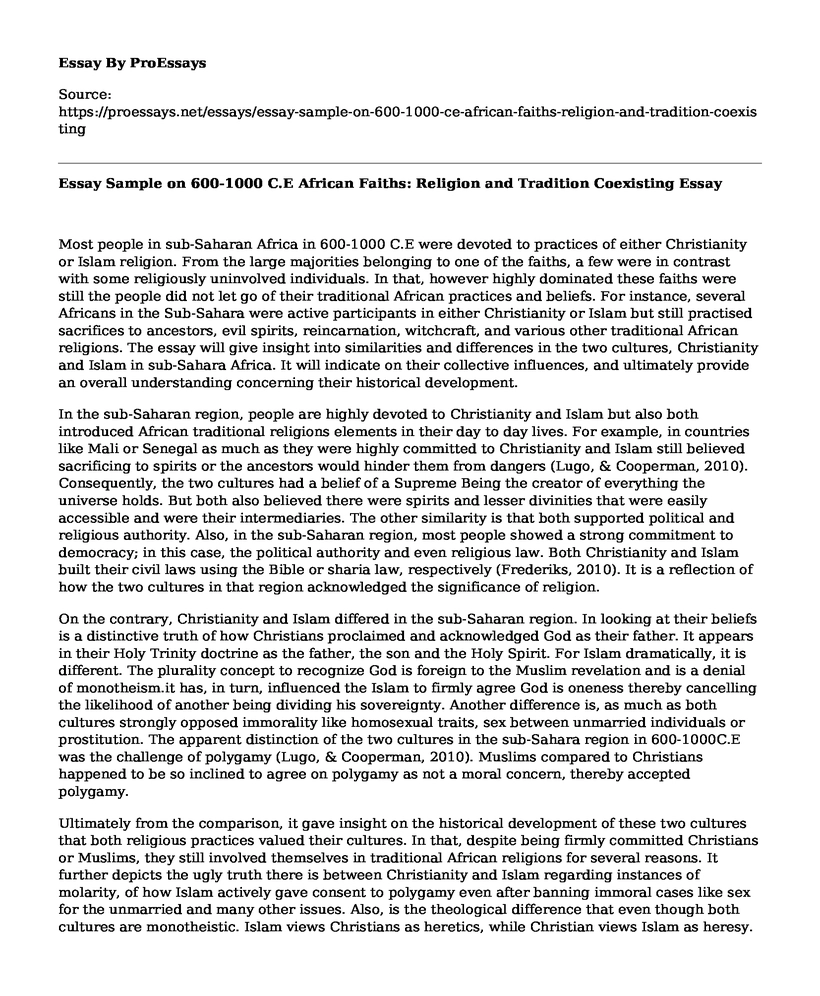Most people in sub-Saharan Africa in 600-1000 C.E were devoted to practices of either Christianity or Islam religion. From the large majorities belonging to one of the faiths, a few were in contrast with some religiously uninvolved individuals. In that, however highly dominated these faiths were still the people did not let go of their traditional African practices and beliefs. For instance, several Africans in the Sub-Sahara were active participants in either Christianity or Islam but still practised sacrifices to ancestors, evil spirits, reincarnation, witchcraft, and various other traditional African religions. The essay will give insight into similarities and differences in the two cultures, Christianity and Islam in sub-Sahara Africa. It will indicate on their collective influences, and ultimately provide an overall understanding concerning their historical development.
In the sub-Saharan region, people are highly devoted to Christianity and Islam but also both introduced African traditional religions elements in their day to day lives. For example, in countries like Mali or Senegal as much as they were highly committed to Christianity and Islam still believed sacrificing to spirits or the ancestors would hinder them from dangers (Lugo, & Cooperman, 2010). Consequently, the two cultures had a belief of a Supreme Being the creator of everything the universe holds. But both also believed there were spirits and lesser divinities that were easily accessible and were their intermediaries. The other similarity is that both supported political and religious authority. Also, in the sub-Saharan region, most people showed a strong commitment to democracy; in this case, the political authority and even religious law. Both Christianity and Islam built their civil laws using the Bible or sharia law, respectively (Frederiks, 2010). It is a reflection of how the two cultures in that region acknowledged the significance of religion.
On the contrary, Christianity and Islam differed in the sub-Saharan region. In looking at their beliefs is a distinctive truth of how Christians proclaimed and acknowledged God as their father. It appears in their Holy Trinity doctrine as the father, the son and the Holy Spirit. For Islam dramatically, it is different. The plurality concept to recognize God is foreign to the Muslim revelation and is a denial of monotheism.it has, in turn, influenced the Islam to firmly agree God is oneness thereby cancelling the likelihood of another being dividing his sovereignty. Another difference is, as much as both cultures strongly opposed immorality like homosexual traits, sex between unmarried individuals or prostitution. The apparent distinction of the two cultures in the sub-Sahara region in 600-1000C.E was the challenge of polygamy (Lugo, & Cooperman, 2010). Muslims compared to Christians happened to be so inclined to agree on polygamy as not a moral concern, thereby accepted polygamy.
Ultimately from the comparison, it gave insight on the historical development of these two cultures that both religious practices valued their cultures. In that, despite being firmly committed Christians or Muslims, they still involved themselves in traditional African religions for several reasons. It further depicts the ugly truth there is between Christianity and Islam regarding instances of molarity, of how Islam actively gave consent to polygamy even after banning immoral cases like sex for the unmarried and many other issues. Also, is the theological difference that even though both cultures are monotheistic. Islam views Christians as heretics, while Christian views Islam as heresy. Islam does not consider God as the holy trinity and suggests that to be a division of oneness of God.
References
Frederiks, M. T. (2010). Let Us Understand Our Differences: Current Trends in Christian-Muslim Relations in Sub-Saharan Africa. Transformation, 27(4), 261-274.Retrieved from: https://doi.org/10.1177/0265378810378562
Lugo, L., & Cooperman, A. (2010). Tolerance and tension: Islam and Christianity in sub-Saharan Africa. Washington, DC, Pew Research Center, 147.Retrieved from: https://www.pewforum.org/2010/04/15/executive-summary-islam-and-christianity-in-sub-saharan-africa/
Cite this page
Essay Sample on 600-1000 C.E African Faiths: Religion and Tradition Coexisting. (2023, Mar 12). Retrieved from https://proessays.net/essays/essay-sample-on-600-1000-ce-african-faiths-religion-and-tradition-coexisting
If you are the original author of this essay and no longer wish to have it published on the ProEssays website, please click below to request its removal:
- The Nature of Faith Essay
- The Tale of the Bamboo Cutter Essay Example
- Essay Sample on Mythology Theory in Popular Culture
- Essay Example on Edo Period: Japan's Warrior Culture & Urbanization
- Free Essay Example on Migrant Latino Families in the US: Cultural Acculturation of Puberty Practices
- Free Essay Sample on Interpreting Bible Scriptures
- Capitalist Economic System Compatibility with the Buddhist Economics - Paper Example







